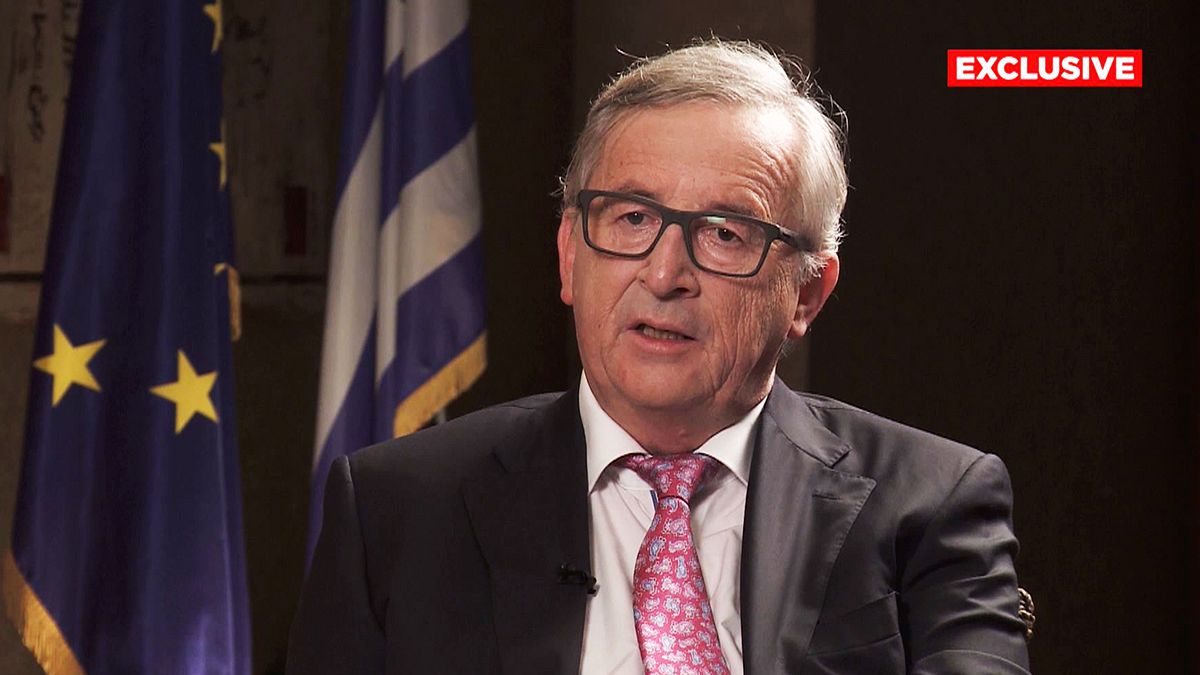How would the European Union respond should “Brexit” become a reality after this Thursday’s referendum in the UK?
How would the European Union respond should “Brexit” become a reality after this Thursday’s referendum in the UK?
European Commission President Jean-Claude Juncker was playing down the eventuality as he spoke to Euronews in Athens about the British vote and the major issues facing the EU today.
Stamatis Giannisis, Euronews:
These days the eyes of Europe are fixed on Britain. If the British finally decide to leave the EU how damaging this may be to both the EU and to Britain?
Jean-Claude Juncker, European Commission President:
I hope that the British will be led by common sense, because common sense is a British virtue. So I hope that “Brexit” will not be the result of the referendum. But if “Brexit” will be the result of the referendum this would both harm the European Union and Britain. Without Britain the European Union would no longer be complete and without the British pragmatism, the down-to-earth, the no-nonsense approach the British very often are approving, the European Union would not change its nature but there would be a missing element.
Stamatis Giannisis:
Let’s come to Greece now. One year ago Greece was on the verge of leaving the eurozone. In the months that have passed since then what has changed and to what extent is the EU satisfied with the pace of reform taking place in the Greek economy?
Jean-Claude Juncker:
I was fiercely fighting for Greece to remain in the euro area, because (neither) the European Union (nor) the euro area would be complete without our Greek friends. What changed? Something has changed because since the summer of 2015 nobody is seriously advocating “Grexit”. And this is due to the fact that we were able – the Greek authorities and the authorities of the euro area – to conclude the deal and this deal is respected by both sides.
Stamatis Giannisis:
So you are satisfied with the pace of the reform?
Jean-Claude Juncker:
I am never satisfied with the pace of reforms in none of the 19 countries of the euro area but Greece is undertaking huge efforts. And I know that these efforts are seen by many many Greeks – mainly the poorest parts of Greek society – as being unjust. And I know that together the Greek government and the euro area policymakers are putting a huge responsibility on the shoulders of each and every Greek citizen. And I admire the Greeks for the way they are dealing with these problems. So I am not satisfied but I am more satisfied than I thought I could be satisfied in the summer of 2015.
Stamatis Giannisis:
Apart from austerity Greece has also suffered from massive migration and refugee flows. The EU-Turkey agreement seems to be crumbling. Is there a plan B if Turkey pulls out of the deal as Ankara threatens?
Jean-Claude Juncker:
When I was campaigning back in March, April, May, June 2014 for the European elections I was always advocating a different attitude when it comes to Greece, or to Italy or to Malta and others. We cannot leave these countries alone with the consequences of a global problem, and the migration crisis is a global problem. So we have to support the front(line) countries like Greece and we are trying to support Greece as much as can be done. We are spending a lot of money, and rightly so, to support the Greek authorities and I think the deal we have concluded – the 28 member states with Turkey – is a deal which is proving to bring the results we expected because the number of refugees coming from Turkey to the Greek islands was dropping dramatically. So I think that this deal is working and I hope that all parties involved and the Europeans, and mainly the Greeks and the Turkish, will do everything in order to have this deal becoming a remaining (lasting) success.
Stamatis Giannisis:
One other issue that is affecting the Greek economy, the Greek producers mainly, is the Russian embargo on EU products following the sanctions imposed by Brussels to Moscow after the Ukrainian crisis. Are you seeing any chances of improving that situation – either a lifting of the embargo from the Russian side or the EU easing up or removing the sanctions from Moscow?
Jean-Claude Juncker:
I was in St Petersburg attending the Economic Forum only last week and having also meetings with President Putin. And I made it very clear in my speech and in my talks with the Russian president that the Minsk agreement has to be implemented. To put it simply, the more Minsk implementation there will be, the less sanctions there will be. There is an interconnection, a link, between the Minsk agreement and the implementation and the dealing with the sanctions. For the time being it is quite clear that in June we will prolong the sanctions. But in the course of the next coming six months we will have to check if there is enough progress as far as the Minsk implementation is concerned to lift part of the sanctions.
